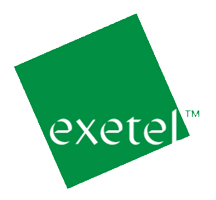Compare NBN Plans & Deals
We compare a large range of NBN providers to help you find an NBN plan that suits your data and speed needs.
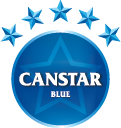
Instantly compare 350+ Canstar Blue expert rated products based on the inputs below
30/06/25. See website for full T&Cs.
Showing 10 of 286 results
Unsure of a term in the above table? View glossary
The initial results in the table above are sorted by Cost per month (Low-High) , then Value Rank out of 10 (High-Low) , then Provider Name (Alphabetical) . Additional filters may have been applied, which impact the results displayed in the table - filters can be applied or removed at any time.
SPONSORED
NBN Fixed Line | No lock-in contract
-
$35/month off any internet plan! A benefit packed Electricity plan which unlocks a $35/mth discount on any Origin internet plan! T&C's Apply
Latest in internet
How to choose the best NBN plan for you
Choosing the best NBN plan can be a bit daunting, especially considering the sheer number of providers and plans out there, and the confusing jargon and plan structure. Generally, you need to look out for the right combination of these three things:
Choose the right NBN speed
Residential customers now have the choice of six NBN speed tiers, but availability will depend on your NBN connection type. While it’s natural to want the fastest plan possible, NBN plans are also priced by speed tier, so faster speeds mean a bigger bill – so you’ll want to make sure you’re on the right plan for your needs and your budget.
The most popular speed in Australia is NBN 50, which offers a maximum download speed of 50Mbps, plus upload speeds of up to 20Mbps. This speed is suitable for moderate to heavy internet users, and is fast enough to support HD video streaming, online gaming and video calling for three to four people simultaneously.
Basic users may prefer the cheaper NBN 12 or NBN 25 tiers, while large households on eligible NBN connections may also want to look at NBN 100, NBN 250 or even NBN 1000, if you’re happy to pay more for ultra-fast speeds.
Small households
- NBN 25 (Home Basic II)
- One to two people, or light to moderate users
- Suits web browsing, one or two HD video streams
Medium households
- NBN 50 (Home Standard)
- Three or four people, small families, moderate to heavy users
- Suits multiple HD streams, video calls, online gaming
Big households
- NBN 100 (Home Fast)
- Suits four or more people, heavy users and larger families
- Ideal for 4K video streaming, downloading large files, online gaming
Who is the fastest NBN provider?
It’s hard to pick a single fastest NBN provider, but some telcos do typically out-perform many of their competitors when it comes to average download or upload speeds. A good indicator is the ACCC’s quarterly Measuring Broadband Australia report, which looks at the average performance of the most popular NBN providers in the country.
The ACCC’s report in December 2024 listed Exetel as the strongest performing telco for the first time, but other consistently-fast providers include TPG, Telstra and Optus. This report looks into how close to the maximum available speed each provider’s plans typically come during high-traffic periods, and how well telcos handle high-bandwidth activity such as HD video.
Canstar Blue also includes speed and reliability as a factor in its yearly NBN Providers Ratings, which are based on feedback from thousands of NBN customers. In our 2024 ratings, winning provider Aussie Broadband was awarded a full five-star score for speed, along with Exetel and iPrimus, while the remaining providers scored four or three stars.
What speeds can I actually expect from the NBN?
Each NBN speed tier offers a maximum download and upload speed, although your real-world performance may not be quite as fast. You may also find that you’re sometimes hitting speeds slightly over the advertised maximum, as NBN Co will sometimes over-provision capacity on certain tiers during busy periods. During lower traffic periods, such as very late at night, you’ll typically experience faster speeds due to less people using the network. In peak hour times (between 7pm and 11pm), your speeds will likely slow down somewhat, but a good plan should still deliver at least 90% of the potential maximum speed available. Here’s what we think a ‘good’ internet speed in Australia is.
If you’re looking for a busy hour performance, you’ll want to also check your intended telco’s listed Typical Evening Speed (TES). This is the average speed users will experience during peak periods (between 7pm – 11pm) and is generally the most accurate indicator of how fast your service will actually be.
How can I improve NBN speed?
There are many factors that can impact your NBN speed, including congestion in your area, the plan and provider you opt for, your location and connection type, and even the modem you’re using. Aside from changing your provider or plan, some DIY tricks to improve your internet speed include using WiFi extenders or mesh networks, switching off your VPN, upgrading your modem/router, and repositioning your modem for a better connection.
Test how fast your internet speed is with our free tool
Find the right price for NBN
Every Aussie household wants a reliable connection that won’t drop out or slow down, but the average internet bill does vary between families and individuals. If you’re on a tighter budget, you may be limited in terms of the maximum speeds you can comfortably afford each month. In contrast, if you’re a heavy video streamer or a big online gamer, you may be happy to pay a little extra for a faster plan.
Cheapest NBN plans
If you’re looking for the lowest monthly cost, the cheapest NBN plans are usually found on the entry-level NBN 12 speed tier. We update our database daily so you can compare the cheapest NBN plans available right now.
Best-value NBN plans
At Canstar Blue, we have designed an expert ‘Value Rank’ methodology to determine the best value NBN plans available in Australia right now, based on a combination of price and features.
Can you save money by getting a data capped plan?
If you’re not a heavy data user, or just need a basic plan for occasional web browsing and emails, you may benefit from a capped data plan. This means that instead of unlimited data, your monthly usage will be restricted to anywhere from 10GB to 500GB, depending on your plan and provider, with any excess data usage normally ‘throttled’ to slower speeds, typically around 1Mbps.
This can be a good way to shave $10-$15 or more each month off your NBN plan, but be aware that most providers do tend to offer unlimited data as standard. Telcos who do sell capped data options, especially for cheaper speed tiers, include TPG, Aussie Broadband and iiNet.
Do NBN plans come with any extras?
Many NBN providers offer add-ons such as home phone, optional modems, and even added streaming entertainment like Netflix or set-top boxes (for example, Fetch TV or Hubbl). Other extras that may be available with your plan include home internet security and anti-virus packages, WiFi extenders, and mobile phone or energy bundles; what’s available to you will depend on your provider and choice of plan.
Can I get my NBN plan bundled with my phone?
As noted above, some telcos do offer customers mobile phone and NBN plan bundles, and discounts may be available for combining both products under one account. Most of the big-name NBN providers also sell mobile phone SIM plans in addition to home internet, so you may be able to save on your combined bills by bundling (as long as you’re on a phone and internet plan that’s right for your needs and budget).
Identify your NBN connection
The performance and potential speed of your NBN plan will depend on the NBN connection type available at your address. This refers to the type of NBN technology used to connect your home to the NBN network. Some of the main connections available to Australians are below.
- FTTP (Fibre to the Premises)
Connects your home directly to the nearest NBN node via fibre optic cable, and is the fastest NBN connection type available. - FTTB (Fibre to the Building)
Mostly used in apartment blocks, by connecting each apartment or unit via copper wiring to a central node in a building’s basement. - FTTN (Fibre to the Node)
Uses your home’s existing copper wiring to connect to an NBN node in your area. - FTTC (Fibre to the Curb)
Similar to FTTN, but runs fibre optic cable to a distribution point outside your home, which is connected to your house via copper wiring. - Satellite
Beams an NBN network signal from the SkyMuster satellite to a dish installed on your home. Mostly used in regional areas.
How do I find out my connection type?
You can find your home’s NBN connection type via NBN Co’s website, or by entering your address in your NBN provider’s address check tool.
Can you upgrade your NBN connection?
Previously, NBN Co offered customers the choice to upgrade to a faster FTTP connection via its Technology Choice Program; however, this was a complicated and expensive process. NBN Co has since begun rolling out free FTTP upgrades to more than three million eligible addresses that can currently only access FTTN or FTTC. Check NBN Co’s website to see if your address is eligible.
Are there any better alternatives to the NBN?
If you’re unable to get reliable or fast NBN at your home, there are a range of NBN alternatives available. Depending on your location, you may have access to options such as non-NBN fibre networks (such as OptiComm or GigaComm), 4G or 5G home internet (also known as home wireless broadband), or mobile broadband. Regional customers may also be eligible for Starlink satellite internet.
Compare the best NBN plan providers
Each year, Canstar Blue surveys thousands of NBN users to determine which NBN provider offers the best customer satisfaction.
NBN Providers: Most Satisfied Customers award winner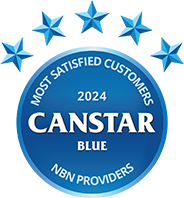
Aussie Broadband was a back-to-back winner in our 2024 Most Satisfied Customers award for NBN providers, scoring five stars across almost all categories, except value for money and ease of setup, where it scored four stars.
Canstar Blue’s Outstanding Value Award is based on our unique value rank methodology, and highlights NBN providers offering superior value and features.
NBN plans: Outstanding Value award winner 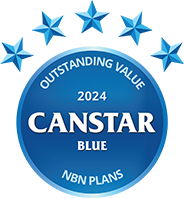
Our 2024 award for Outstanding Value NBN plans goes to Tomi, which previously won for fast-speed NBN plans. It offers a range of competitively priced plans with added value, along with a range of speeds to suit different household needs.
High-speed NBN plans: Outstanding Value award winner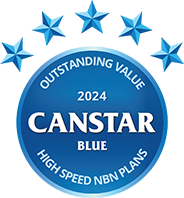
Taking out our 2024 award for Outstanding Value High-Speed NBN plans is Superloop. This fast-growing provider offers cheaper pricing with higher download speeds, along with competitive features like free speed boosts and discounts.
Compare NBN plans from the big three providers

- Offers a range of plans and speeds, from NBN 25 to NBN 1000
- Unlimited data is included on all plans
- Modem included on all plans free, however you’ll need to return the modem or pay a $200 non-return fee if you cancel before 24 months
- Access to extras such as rewards program, subscription bundling, etc
- Offers plans and speeds to suit a range of users and households, from NBN 50 to NBN 1000
- Internet Entertainer plans include extras such as Netflix
- Unlimited data included on all plans
- Modems included for $0 when you stay connected for 36 months (you’ll pay off the remaining modem costs if you cancel before then)
Compare NBN plans from popular small providers
Keep in mind that while there are the big internet companies which have a large portion of market share, there are plenty of smaller providers to choose from. Looking at offers from a range of telcos, both the big and small names, will help you to find the best solution for your home.
- Offers a wide range of plans and speeds, from NBN 12 to NBN 1000
- Unlimited data and capped data options available
- Optional extras include a variety of modems and home phone plans
- Smaller speed range from NBN 15 to NBN 250 speeds, but competitive prices
- All plans include unlimited data and no contracts
- Discounts available when you bundle with Dodo Energy
- Offers a range of plans and speeds, from NBN 12 to NBN 1000
- Unlimited data included on NBN 25 plans and up
- Optional extras include modems and home phone
- Offers a range of unlimited plans from NBN 25 to NBN 1000
- No lock-in contracts
- Discounts available for customers who bundle with Origin energy plans
How to switch NBN plans
If you’re already on an NBN plan, but want to move to a different provider, switching is simple.
- Compare NBN plans using Canstar Blue to find the right NBN plans and provider for you. You’ll want to look at your budget, the speed you’ll need for your household size and usage, and if you want any extras such as modems or home phone.
- Sign up with your new provider. If you’ve found a great plan with Canstar Blue’s comparison tool, you can click through in your search results to be taken straight to the provider’s website. You can order a new plan easily online or if you prefer, over the phone.
- Contact your current provider to cancel your old NBN plan and settle any remaining bills and charges. Once your new plan is in place, you should be switched over within one to three business days.
Do I need a new modem?
You’ll need an NBN-compatible modem to connect, so if you’re using an older piece of hardware you’ll most likely need to upgrade. The exact type of modem you need may depend on the technology used to supply NBN to your home, but your NBN provider can advise you what kind of modem/router is suitable for your plan at sign-up (and often supply it to you directly, either included in your plan price or as an additional purchase).
Are there any costs involved in cancelling an NBN plan?
If you’re on a month-to-month plan, you should be able to cancel your plan at any time without incurring any early termination costs – simply pay out your final NBN bill, and you’re free to go. However, some providers may hit you with modem charges if you leave within 12, 24 or 36 months, even without a contract — for example, Telstra, Optus and Vodafone each include a modem with NBN plans, but it’s only ‘free’ if you stay connected for a minimum period.
If you are on a contract, you may be subjected to an early termination charge, which is calculated based on the remaining months you have left on your plan.
About our NBN experts
 Tara Donnelly: Utilities Editor
Tara Donnelly: Utilities Editor
As Canstar Blue’s Utilities Editor, Tara Donnelly covers the electricity, internet and mobile sectors – topics she’s spent a decade focused on, alongside consumer technology, within the comparison industry. Her telco expertise has seen her appear in national media including 9 News, 7 News, Sunrise, the ABC and The Sydney Morning Herald.
Meet the Editorial Team

Josh Filosi: Data Insights Analyst
Josh Filosi is Canstar’s Data Insights Analyst, and helps develop and deliver the methodology for Canstar Blue’s Value Rankings and Awards for the telco industry. He holds a double-major in Economics and Behavioral Science, and enjoys interpreting complex data. Connect with Josh on LinkedIn.
Meet the Research Team
FAQs about NBN Plans
NBN Glossary
Important information
For those that love the detail
This advice is general and has not taken into account your objectives, financial situation or needs. Consider whether this advice is right for you.






















